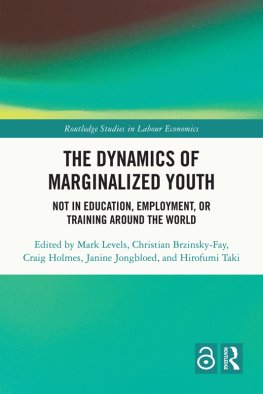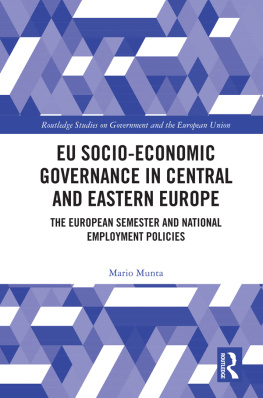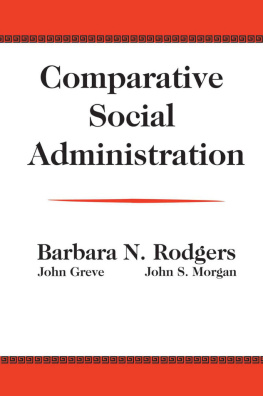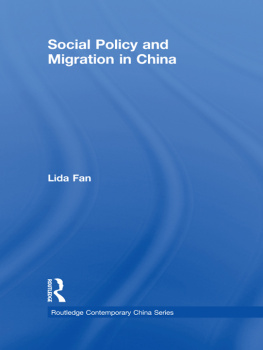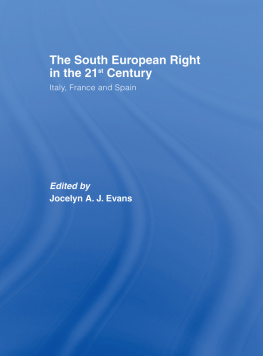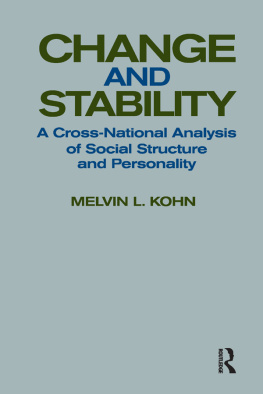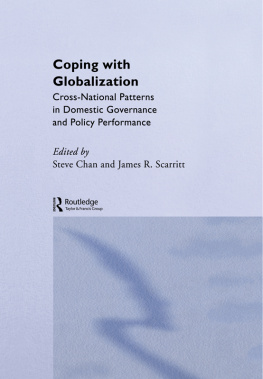YOUTH IN TRANSITION
In memory of my brother Jan
Youth in Transition
Housing, employment, social policies and families in France and Spain
Teresa Jurado Guerrero
Universidad Nacional de Educatin a Distancia, Madrid
First published 2001 by Ashgate Publishing
Reissued 2018 by Routledge
2 Park Square, Milton Park, Abingdon, Oxon OX14 4RN
711 Third Avenue, New York, NY 10017, USA
Routledge is an imprint of the Taylor & Francis Group, an informa business
Copyright Teresa Jurado Guerrero 2001
All rights reserved. No part of this book may be reprinted or reproduced or utilised in any form or by any electronic, mechanical, or other means, now known or hereafter invented, including photocopying and recording, or in any information storage or retrieval system, without permission in writing from the publishers.
Notice:
Product or corporate names may be trademarks or registered trademarks, and are used only for identification and explanation without intent to infringe.
Publisher's Note
The publisher has gone to great lengths to ensure the quality of this reprint but points out that some imperfections in the original copies may be apparent.
Disclaimer
The publisher has made every effort to trace copyright holders and welcomes correspondence from those they have been unable to contact.
A Library of Congress record exists under LC control number: 2001094284
ISBN 13: 978-1-138-72602-4 (hbk)
ISBN 13: 978-1-315-19161-4 (ebk)
This study is one of the first in-depth cross-national comparisons of living arrangements of young people in Europe. It compares two countries and proposes a theoretical framework for understanding international variations in young people's living conditions and transitions to adulthood. For this scope it asks a very concrete question 'Why do some young people stay longer at home than others?' The answer to this question leads to a sociological interpretation of differences in the opportunity structures of young people and of their respective strategies in the transition to social independence. The particularity of the research is that it links micro and macro-level analysis, it matches two national large-scale surveys and it treats a topic which is of relevance for many people and for social policy reforms.
This book poses the question why Spanish young people leave home later than French youth and it answers it front a socio-economic perspective. In 1992, three quarters of French young people had already left home by age 29, while in Spain not even the majority of their counterparts were socially independent. Besides late nest-leaving, most Spanish young people connect departure from home with marriage. By contrast, in France young people leave home very frequently also in order to live in a residence hall for students, to live in a one-person household or to cohabit with a partner.
The study of two large national surveys with logistic regression techniques and the institutional analysis of French and Spanish social policies reveal the existence of different individual strategies for becoming socially independent in the two countries. French young people have to enter a labour market with high unemployment and short-term employment rates. Yet, active employment policy, extensive public housing supply and housing allowances, frequent support from parents and comparatively high wage levels allow them to set up their own households early. Spanish young people face a labour market with even higher unemployment and short-term employment rates, and the difficult integration into stable employment is not mitigated by a supply of public housing nor by extensive and generous public allowances, but must coexist with a very crowded housing market with high prices and rents. Spanish young people obtain subsistence-level wages comparatively late and they have to rely mainly on parental help not only whilst in education but also during the phase of entering the labour market and of acquiring a home. Unlike their French contemporaries, Spanish women have much more difficulties in pursuing an individual strategy of household formation, since they depend more frequently on marriage and on a spouse with a stable job when leaving home.
Teresa Jurado Guerrero
U.N.E.D.
Department of Social Structure
Madrid, April 2001.
A PhD thesis is a personal challenge and it needs much support from different sides. It would have been impossible to go through the last years without the unconditional support of my parents, Maria and Juan who have transmitted to me so many abilities. My partners have been very important; in particular Benno, who for so many years contributed to my happiness and Ivan who transmits to me his optimism and good humour. My friends and flat-mates of the last years made sure that I did not loose contact with real life. I thank all my friends in Germany for not forgetting me during my absence: Hava who is always on my side when I need her, and Maria, Ibo, Hiiseyin, Mario, Brbel and Dieter. I thank my friends in Italy and France who accompanied me during difficult moments: Maria Jos, Elena, Catherine, Manuela, Guido, Franca, Anne, Josep, Gerben, Davide, Guglielmo and Ciaran. The last months of my work in Spain were very nice thanks to Nacho, Kattya and Josu who really took care of me and thanks to Ana, Maria, Daniel, Loli, Susanna, Will and Fabian, and my family in Madrid.
Much of the content of this work is the result of very useful advice from Peter Flora, Manuela Naldini, Lluis Flaquer, Elisabet Almeda, Birgit Fix, Colin Crouch, Mara Jos Gonzlez, Pau Miret, Catherine Marry, Richard Breen, Antonio Villanacci, Guido Legnante, Luis Garrido, Miguel Requena and Juan Jess Gonzlez. Elmar Rieger taught me how to become a sociologist and he always increased my self-confidence. Colin Crouch was like a good father during the years in Florence. Richard Breen helped me a great deal with doing multivariate statistical analysis without losing substance. I thank all my colleagues of the Mannheim Centre for European Social Research, and in particular Franz Kraus and Marlene Alle for their help with questions related to data acquisition and transformation. Jos Saturnino Martnez helped me a lot with the Spanish data. I have to underline the cordial reception and the support received from the researchers of RESCO/LASMAS in Paris, Catherine Marry, Annick Kieffer, Irne Mearelli Fournier and Jal Brinbaum. My time in the Juan March Institute in Madrid also was very nice thanks to the friendly researchers and librarians.
I have received grants and logistic support from many different institutions in Europe. In Germany: Deutsche Forschungsgemeinschaft, Mannheimer Graduiertenkolleg , Deutscher Akademischer Austauschdienst, and Robert Bosch Stiftung. The EURODATA archive of the Mannheimer Zentrum fr Europische Sozialforschung provided me with the Spanish survey "Encuesta Sociodemogrfca, 1991" conducted by the . The completion of the thesis was supported by the Freudenberg Stiftung. In France help came from the Institut de Recherche sur les Socits Contemporaines and the CNRS. The use of the survey "Enqute Jeunes, 1992" conducted by the INSEE was possible thanks to a collaboration with Catherine Marry of LASMAS-IDL. In Spain I received support from the Instituto de Estudios Sociales Avanzados, the Centro de Estudios Sociales Avanzados , the Ministerio de Educacin y Ciencia, Diputado de Barcelona, and the Generalitat de Catalunya. At the transnational level the European Science Foundation, and, last but not least, the European University Institute have to be mentioned. The EUI was a good place to write the dissertation in freedom. I thank Nicki Hargreaves and Nicky Owtram for their help and encouragement with the English language, Cecilia Picchi for her very motivating introduction into the Italian language and Eva Breivik for helping with the completion of the thesis. Last, the preparation of the publication was supported by the Department of Sociology II of the Universidad Nacional de Educacin a Distancia and by Juan with great patience.


